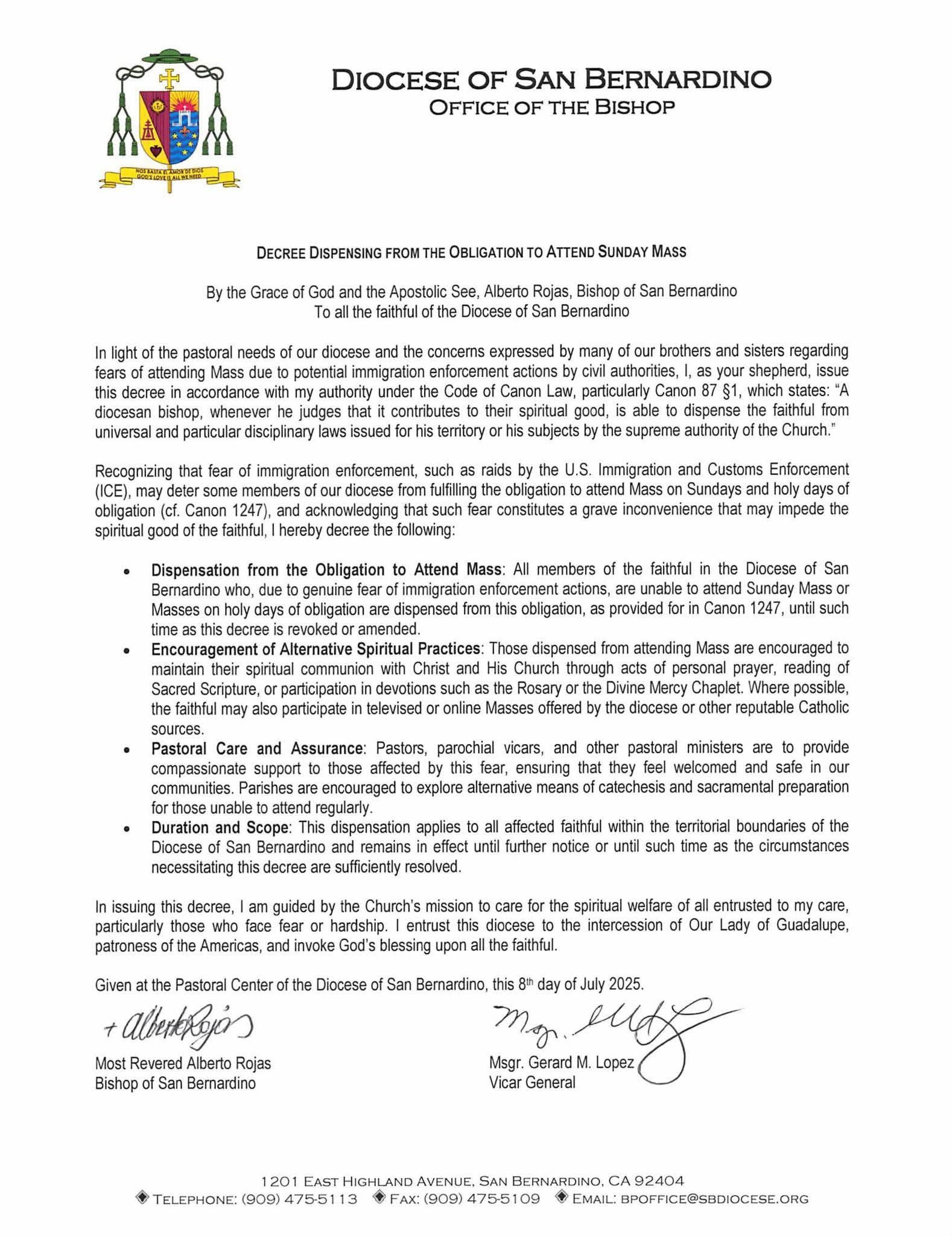In the heart of California, the Bishop of San Bernardino, Msgr. Alberto Rojas, issued on July 8, 2025, a decreedispensing all the faithful of the diocese from the obligation to attend Sunday Mass and holy days of obligation. The reason? The fear, expressed by some immigrants, of being subjected to checks by civil authorities — particularly ICE (Immigration and Customs Enforcement) — near churches or during liturgical celebrations.
On paper, the measure invokes can. 87 §1 of the Code of Canon Law, which allows a diocesan bishop to dispense the faithful from disciplinary laws when this benefits their spiritual good. But it is precisely this supposed “spiritual good” that raises more than one question.
A pastoral decree or a cultural surrender?
The episcopal letter adopts a caring and seemingly compassionate tone: it acknowledges that “the fear of enforcement actions by immigration authorities may prevent some faithful from fulfilling their Sunday obligation,” and thus they are dispensed from the obligation itself. Yet this logic hides a profound ambiguity: if the fear is linked to the risk of deportation, the implicit premise is that the faithful person is illegally present on U.S. territory. And then the spontaneous question arises: is it the bishop’s task to legitimize, even indirectly, legal irregularity?
Rather than offering human and spiritual support for a path toward regularization, the decree seems to normalize the condition of clandestinity, thereby weakening the authority of civil law and undermining the very link between truthand evangelical charity.
The danger of “administrative compassion”
Under the guise of pastoral care, there lurks a dangerous form of clerical paternalism. It is assumed that the only way to protect the faithful is to suspend a fundamental obligation of Christian life — participation in the Eucharistic celebration — rather than strengthen the sense of personal responsibility, collaboration with legitimate authorities, and integration into the civil fabric.
It is the triumph of “administrative compassion” over evangelical truth: an attitude that avoids uncomfortable questions and abdicates the prophetic mission of the Church. What about the rights of other faithful — perhaps lawfully residing immigrants or citizens — to attend Mass in a climate of safety and legality? And what about the public witness of faith, if it is subordinated to the fear of civil authority?
The risk of encouraging illegality
This is not a matter of minimizing the suffering of migrants — often exposed to deeply unjust and inhumane dynamics — nor of advocating blind obedience to civil authorities. But it must be clearly recognized that justice, including social justice, cannot be pursued through indiscriminate exemptions or collective indulgences. A dispensation of this kind risks becoming, in fact, an encouragement to remain undocumented, feeding into a system already undermined by exacerbated identity narratives and a growing erosion of cooperation and trust between the Catholic Church and the State.
Documents like this inevitably take on a political dimension, and as such raise questions about their appropriateness. It is entirely out of place for a bishop to assume the role of intervening so directly in the public debate, disguising as a pastoral act what is in reality an ideological stance. If a law is considered unjust, the appropriate path is not the implicit legitimization of disobedience, but the use of tools provided by the democratic order: political dialogue, legal appeals, civil mobilization. The Church cannot and must not become a shield for those who reject the law while continuing to demand its benefits.
Instead of encouraging community solutions, networks of solidarity, and creative forms of accompaniment and integration, the bishop seems resigned to a logic of “hiding”, as if to suggest that the Christian, to avoid risk, may even renounce the sacramental encounter with the Lord.
A Church that disarms the faith
The greater risk, however, is not only ecclesiological, but also pastoral. With this gesture, the bishop does not merely give in to the logic of fear: he ends up legitimizing it, assuming a role that exceeds his competence and that has inevitable political repercussions. In the name of supposed pastoral care, the principle of legality is compromised and the security of millions of faithful — citizens, legal residents, migrants who have respected the law — is put at risk. They have the right to attend liturgical celebrations in a protected context, not exposed to arbitrariness or the risk of political vendettas.
A Church that, instead of helping to heal social fractures, amplifies them with casual decrees and confused messages, betrays its educational mission and loses credibility in the eyes of those it tries, in vain, to protect. The dispensation granted is not an act of mercy, but a grave error of judgment. As the Catholic world reflects on the meaning of Christian witness in pluralistic and complex contexts, it is legitimate to ask: what kind of Church are we building, if, faced with fragility, we encourage illegality instead of educating in truth and justice?
f.S.A.
Silere non possum
